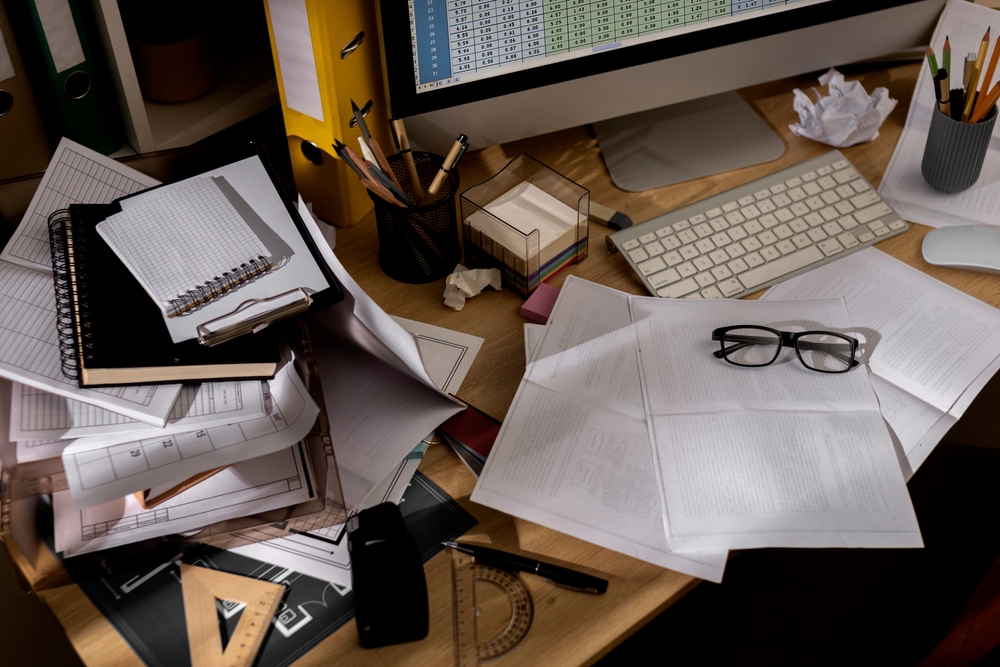Feeling tired all the time, like you’re running on empty, even after a full night’s sleep? It might not be just the weather or your busy schedule. Some everyday habits can secretly drain your energy, leaving you feeling exhausted and depleted. Here are some of the most common culprits, so you can reclaim your energy and feel more vibrant.
1. You spend too much time on social media.

Endless scrolling through social media can be a major energy suck — no, really. Researchers dub the effect “cognitive overload,” PsyPost explains, and it’s a serious problem. It’s easy to get sucked into the vortex of comparing yourself to everyone else, feeling FOMO, or getting caught up in drama and negativity. All that mental and emotional energy adds up! Try setting limits on your social media use, taking regular breaks, and focusing on connecting with real-life friends and family.
2. You hold grudges and resentment.

Anger and resentment are like emotional poison. They eat away at your energy and leave you feeling drained and bitter. Forgiveness doesn’t mean condoning the other person’s behavior, it means freeing yourself from the emotional baggage. Let go of those grudges, make peace with the past, and focus on the present. You’ll be surprised at how much lighter you feel.
3. You’re a chronic worrier.

Are you constantly worrying about the future, replaying past mistakes, or stressing over things you can’t control? Worrying is exhausting! It takes up valuable mental and emotional energy that could be better spent on more productive pursuits. Try practicing mindfulness, journaling, or talking to a therapist to help manage your anxiety and focus on the present moment.
4. You don’t get enough sleep.

This one’s a no-brainer, right? Sleep deprivation can leave you feeling sluggish, irritable, and unable to focus. It can also affect your physical health, making you more susceptible to illness. Make sleep a priority by establishing a consistent sleep schedule, creating a relaxing bedtime routine, and avoiding caffeine and electronics before bed.
5. You’re surrounded by negative people.

You know those friends who always seem to complain, criticize, or drain your energy? Yeah, those are the ones to avoid. Negative energy is contagious, and spending too much time around toxic people can leave you feeling depleted and discouraged. Surround yourself with positive, supportive people who lift you up and make you feel good.
6. You’re always trying to please everyone.

People-pleasing is a surefire way to burn yourself out. It’s impossible to make everyone happy all the time, and trying to do so will only leave you feeling exhausted and resentful. It’s okay to say “no” sometimes and prioritize your own needs. Focus on what makes you happy, and don’t be afraid to let people down occasionally.
7. You’re constantly multitasking.

While it might feel productive to juggle multiple tasks at once, research shows that multitasking actually drains your energy and reduces your overall productivity. It’s better to focus on one task at a time, giving it your full attention. You’ll be surprised at how much more you can accomplish when you focus on one thing at a time.
8. You’re always on the go.

Having a busy schedule is one thing, but constantly rushing from one thing to the next without taking breaks can lead to exhaustion. Your body and mind need time to recharge. Make sure you’re scheduling downtime into your day, even if it’s just for a few minutes. Take a walk, read a book, or simply sit in silence and enjoy a cup of coffee. Your body and mind will thank you.
9. You don’t set boundaries or say “no” often enough.

People-pleasing can be a major energy drain. Saying “yes” to everything, even when you don’t have the time or energy, can leave you feeling overwhelmed and resentful. It’s important to learn to set boundaries and prioritize your own needs. Don’t be afraid to say “no” sometimes, even if it means disappointing people. Remember, you can’t pour from an empty cup.
10. You dwell on the past or worry about the future.

Getting stuck in the past or constantly worrying about the future can rob you of your present energy, Psych Central warns. When you’re ruminating on past mistakes or worrying about what might happen, you’re not fully engaged in the here and now. Practice mindfulness and focus on the present moment. It’s the only thing you have control over.
11. You’re a perfectionist.

Striving for excellence is admirable, but perfectionism can be paralyzing. If you’re constantly striving for unattainable standards, you’ll never feel good enough. This can lead to exhaustion, anxiety, and a lack of self-worth. Remember, it’s okay to make mistakes and not everything has to be perfect. Embrace your imperfections and focus on progress, not perfection.
12. You have a cluttered and disorganized environment.

Believe it or not, physical clutter can create mental clutter. A messy home or workspace can make it difficult to focus and can increase feelings of stress and overwhelm. Take some time to declutter your surroundings, organize your belongings, and create a space that feels calm and inviting. A tidy environment can do wonders for your energy levels.
13. You neglect your creative outlets.

Creativity is a powerful source of energy and joy. Whether it’s painting, writing, music, or any other form of creative expression, making time for your passions can recharge your batteries and spark your inner fire. When we neglect our creative side, we can feel stagnant and uninspired. Make time for activities that ignite your passion and creativity.
14. You compare yourself to other people.

As Forbes points out, the comparison game is a losing battle. There will always be someone who seems to have it more together, be more successful, or have a better life. Focusing on what you lack only breeds insecurity and dissatisfaction. Instead, celebrate your own unique strengths and accomplishments. Focus on your own journey and don’t get caught up in comparing yourself to anyone else.
15. You’re addicted to drama.

Do you thrive on conflict and chaos? Do you find yourself drawn to dramatic situations or people? This might seem exciting in the moment, but it’s a recipe for emotional exhaustion. Drama drains your energy and leaves you feeling depleted. Look for calm, supportive relationships and focus on creating a peaceful environment for yourself.
16. You don’t take time for yourself.

Self-care isn’t selfish, it’s essential! If you’re constantly putting everybody else’s needs before your own, you’re bound to burn out. Make time for activities that recharge your batteries, whether it’s reading a book, taking a bath, or simply going for a walk in nature. Prioritizing your own well-being will not only benefit you, but it will also make you a better friend, partner, and parent.
17. You have unresolved trauma or emotional baggage.

Past traumas can have a lasting impact on your energy levels and emotional well-being. If you’re carrying around unresolved emotional baggage, it can weigh you down and make it difficult to move forward. Consider going to therapy or counseling to process your emotions and heal from past hurts. This can be a transformative experience that frees up your energy and allows you to live a more vibrant life.
Enjoy this piece? Give it a like and follow PsychLove on MSN for more!




